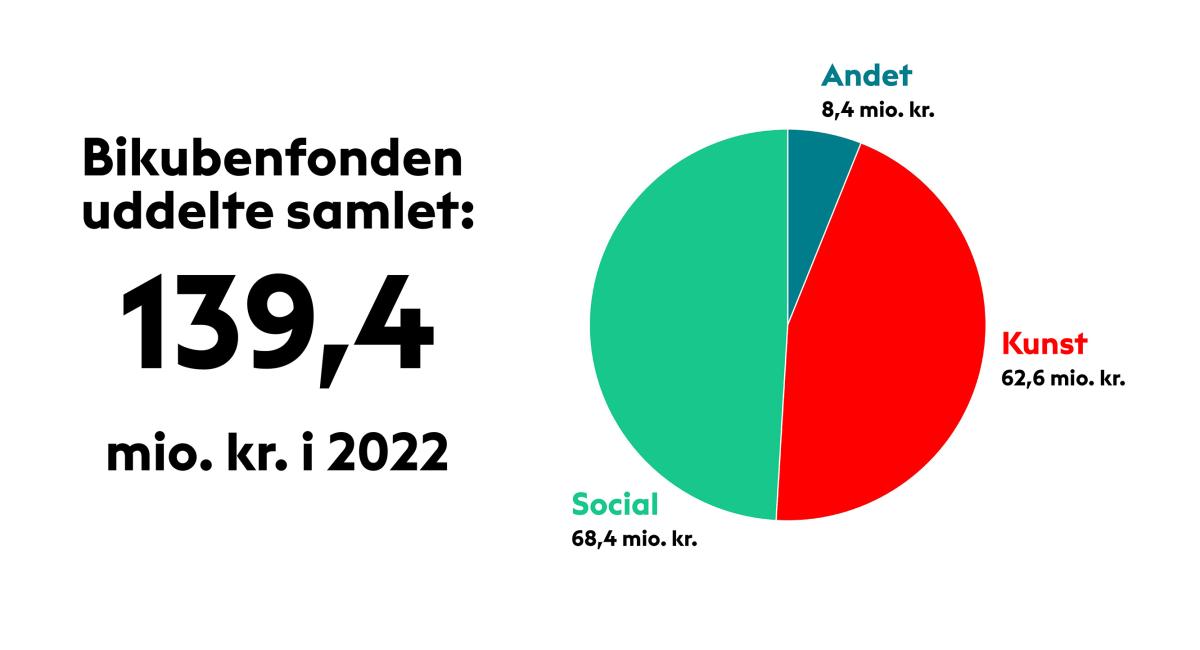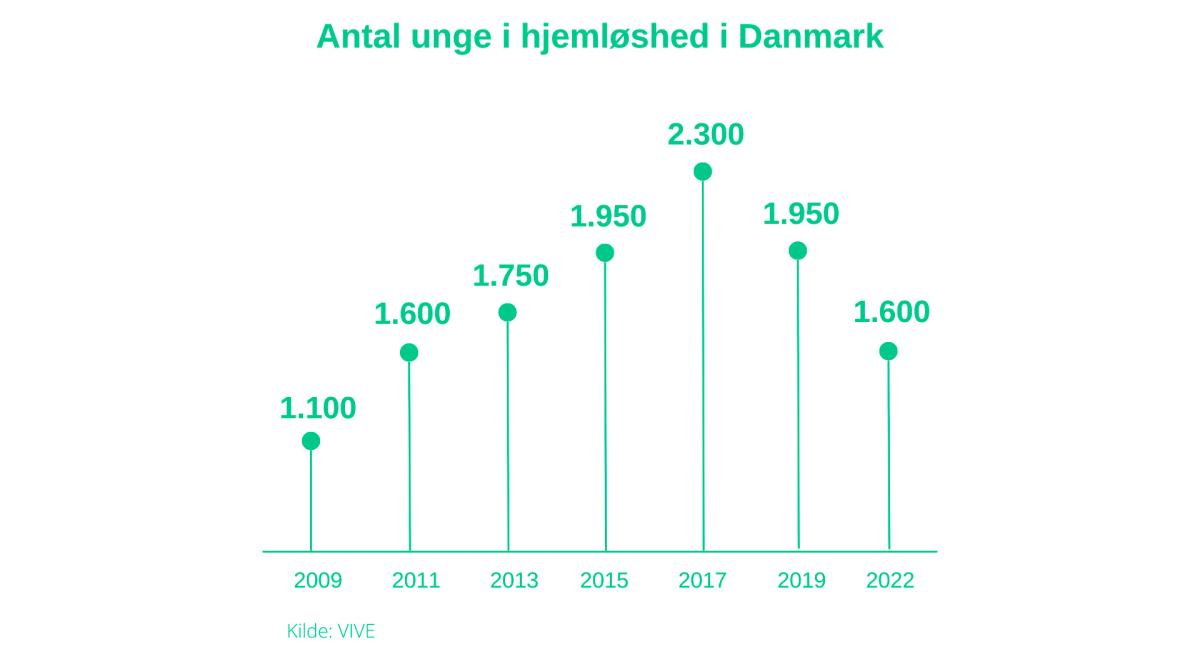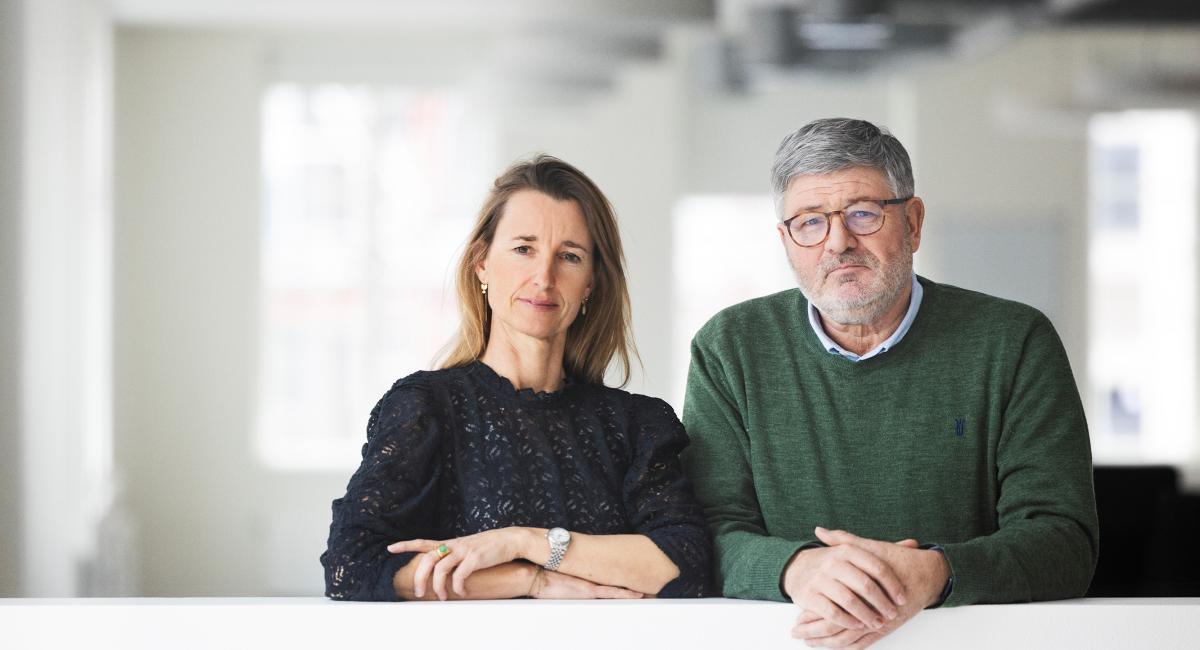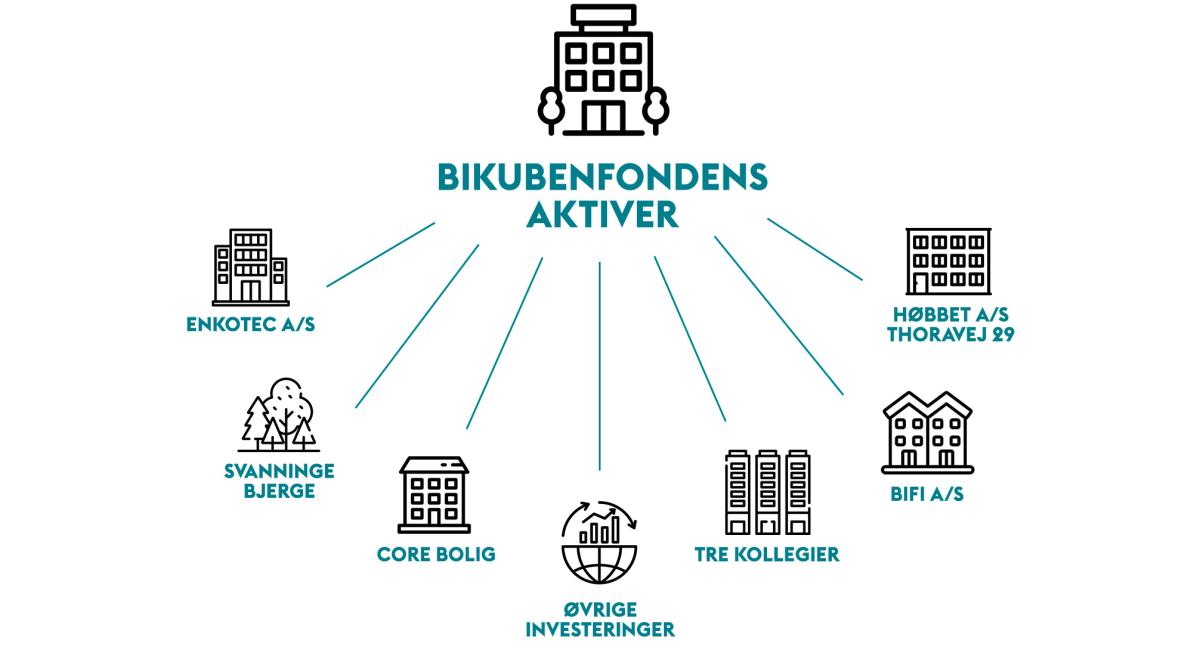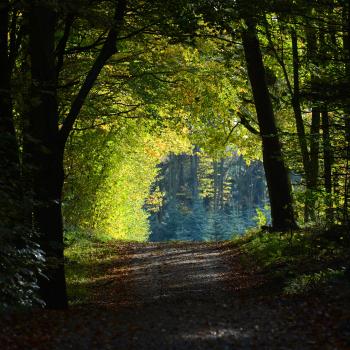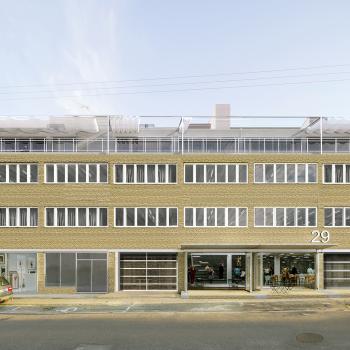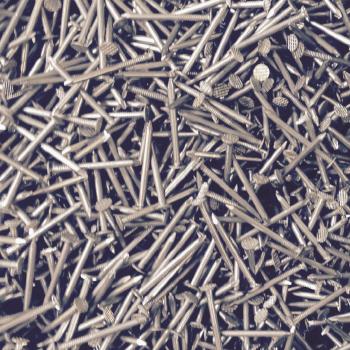Annual report 2022
The Bikuben Foundation has its historical and conceptual roots in the Danish savings-bank movement. Sparekassen Bikuben was established in 1857 in response to the need for improved welfare services for the growing working class of Copenhagen. The assets of the Bikuben Foundation stem originally from the transition, in 1989, of Sparekassen Bikuben to Sparekasse Aktieselskab, a limited company. Today, we invest in firms, stocks, and bonds, as well as credit bonds, in order to generate returns that can be used towards the foundation’s philanthropy.
The Bikuben Foundation’s work remains grounded in the fundamental ideas that shaped the savings bank: social responsibility, innovation, and self-help. Our purpose is threefold:
- we conduct financial business through investments
- we provide grants, loans or otherwise assist Danish tradesmen and small industrial enterprises
- we seek to further philanthropic and charitable goals, as directed by the board
The four values that guide our work are: collaboration, innovation, risk-aversion, and long-termism. Keeping these values in mind, we are committed to being transparent, facilitative, values-based and constructive.
In recent years, we as a foundation have transformed ourselves from making grants to qualified applicants to supporting philanthropic causes using several different tools. Today, we create opportunities and effect change in the focus areas we work with through alliance-creation, process-development, knowledge-creation and the establishment of new facilities.
Read more about the work of the Bikuben Foundation here.
In 2022, grant distributions totalled DKK 139,4m distributed as DKK 62,6m to current performing and visual arts, DKK 68,4m to young people on the edge, and DKK 8,4m to other purposes.
The Bikuben Foundation made 139.4 million kroner in grants in 2022. At the end of 2022, 225 million kroner was set aside for new grants, the same amount as was set aside in 2021. Grants fall into three categories: social affairs, the arts and other. We made 62.6 million kroner in grants to the arts in 2022. Social-affairs grants amounted to 68.4 million kroner. Grants for other purposes amounted to 8.4 million kroner.
The foundation has cultivated its role as a partner that contributes to innovation in our focus areas. Working closely with our partners, we contribute our knowledge, skills and network. We believe that this is the best way to create systemic changes for young people on the edge and the best possible future for arts institutions and for the arts as a career. In 2022, we undertook development initiatives and established partnerships in both of our focus areas.
See all 2022 grant recipients here.
SOCIAL AFFIARS — WE WILL CREATE NEW OPPORTUNITIES FOR YOUNG PEOPLE ON THE EDGE
In social affairs, we work to create innovative opportunities for people aged 13-30 who find themselves on the margins of society. Our goal is to help them take charge of their own lives. We seek to achieve this by: 1) working to stop homelessness among young people. 2) ensuring that young people who have been removed from the home receive adequate support as they transition out of child protection. 3) ensuring that all young people have access to work, education, and strong communities.
The aim of all our work is to create systemic change. That is why we work across disciplines and professions — and always in the interest of young people — to generate new knowledge, test new ideas, mobilise stakeholders and set agendas. We believe this approach will allow us to create the changes that are necessary if innovative opportunities for young people on the edge are to arise.
The homelessness curve has been broken
Under the auspices of The Alliance, A Home For All, the Bikuben Foundation works to end homelessness among young people. Our efforts to address youth homelessness began in 2013, and three years later we helped establish The Alliance, A Home for All, a partnership that today includes 20 members. Throughout the life of the alliance, we have advocated for reforms to the way homelessness is addressed to eliminate the structural conditions that perpetuate the problem. Together with the alliance, we have worked to spread the “housing first” method of combining suitable housing with adequate social services. The 2022 homeless census, conducted by the Danish Centre for Social Science Research, showed that after consecutive years of increases, the number of homeless appears to be on the decline.
The survey shows that homelessness among 18-29-year-olds — who previously figured heavily in the statistics — fell by 18%. That decrease is due to targeted efforts by a few councils, in particular Aarhus and Odense, where alliance partners have been applying the housing-first method for several years.
Thanks to the close interaction among civil-society organisations, and other public and private-sector stakeholders, the Alliance, A Home For All has succeeded in encouraging new ways of approaching and thinking about homelessness. The alliance shows us that, when we come together, we can draw on each other’s strengths and secure common ground when we want to create systemic change.
In 2023, we will, among other things, continue to work together with the Alliance, A Home For All to promote housing first and to translate the 2021 National Homeless Strategy’s commitment to addressing the issue into a local commitment. Together with the alliance, we will encourage councils and local stakeholders to work together to transform their local homelessness programming into a housing-first approach that combines housing, services, and communities. We will, among other things, work together with a group of councils and foundations as part of the Better Approaches to Youth Homelessness programme.
Further, we will work together with the Alliance, A Home For All, and KBH+ / Askovfonden to learn more about how to help young people live in a group setting together with people their own age, instead of placing them in housing specifically built to alleviate youth homelessness. The effort is a part of the Live Together initiative at our the Bikuben Foundation’s halls of residence in Copenhagen and Odense, where 10% of the rooms are reserved for young people no permanent place to live.
Learn more about the Alliance, A Home For All and the housing-first method here.
New knowledge and innovation process to ease the transition from care outside the home to adulthood
We also continued our efforts to help young people who have been removed from the home in their transition to adulthood. We did this as part of our participation in Policy Lab and as part of an innovation process that will include councils and NGOs in the development and testing of ideas.
As part of our work with Policy Lab, we joined with PwC in the spring to publish the Unges vej ind i voksenlivet (Path to Adulthood) study, which brought about new knowledge about young people being cared for outside of the home and aftercare. The study shows that one in three young people who have been removed from the home do not receive aftercare when they turn 18, and, for those who are offered aftercare, the help is short-lived. This despite documentation that aftercare makes good economic sense, both at the individual level and for society. We launched the study at a summit as part of a presentation titled "18 and Alone", that featured decisionmakers and stakeholders in the field discussing initiatives and new funding avenues inspired by the report’s findings.
The vision for Policy Lab is to create a better structural framework, contribute to the development of new procedures and, not least, identify the issues that are important for young people as they age out of care, but which are not being addressed. Based on several conditions identified by De Anbragtes Vilkår, a lobby group for children who have been removed from the home, and Policy Lab, we initiated an innovation process in the spring that seeks to come up with proposals for ways to offer better assistance to children who have been removed from the home. A key part of the innovation process will be gathering the experiences of young people, just as it will seek to connect local and national stakeholders affiliated with Policy Lab and matching the participants in teams of councils and NGOs. Five councils and four NGOs have teamed up with people who have been cared for outside of the home to identify innovative proposals for bettering the transition out of the care system.
In 2023, we will continue working with the next phase of the innovation process, during which three teams, each made up a council and an NGO, will test and develop their innovative concepts over a two-year period in close collaboration with us. Through our participation in Policy Lab — by organising debates and mobilising stakeholders — we will promote the radical rethinking of aftercare mandated by legislation passed by a broad majority of the parties in the Folketing.
Learn more about:
Policy Lab here
Innovation process here
Mobilising stakeholder input
In Denmark, almost 45,000 young people between the ages of 15 and 24 are neither in school nor employed, placing them on the margins of society. This has been the case for decades despite numerous reforms. This has major consequences for the individual young person and for society. With the ambition of mobilising key civil-society organisations, businesses and the public sector, we, together with a number of stakeholders, took the initiative in the spring to form En Vej til Alle, a coalition that seeks to identify initiatives that work, secure the engagement and commitment of decision-makers and other key players and, not least, work with young people themselves to come up with new ways of doing things.
The initial goal of the partnership was to provide the Reform Commission, a government panel that identifies policy areas that would benefit from reform, with recommendations for innovative solutions that can ensure that young people who are neither employed nor enrolled in school — and thus are on the edge of society — find their way in life. The coalition believes that there is a fundamental need to restructure the system, and that successfully doing so requires action on behalf of the public and private sectors, as well as civil society. The meetings and debates organised by En Vej til Alle in 2022 placed the partnership in close dialogue with the Reform Commission and exposed its members to the voices of young and experienced experts. Our work with En Vej til Alle has shown us how a co-ordinated effort by the key stakeholders working on an issue can open doors and pave the way for dialogue and co-operation.
In 2023, we look forward to receiving the Reform Commission’s findings and to work as part of the coalition to arrange further debates, launch a “change coalition”, experiment and be involved in “learning communities” so that no young Dane ever finds themselves at the edge of society.
Learn more about:
En Vej til Alle here
THE ARTS — WE WILL CREATE NEW OPPORTUNITIES FOR CURRENT PERFORMING AND VISUAL ARTS
Our work in the arts is based on a strong conviction that the arts are important. We want to support the wealth of ideas and quality that exists in the arts, create space for experiments and new thinking and pave the way for artistic development in current visual and performing arts.
We do this via four tracks:
- development of arts institutions
- stimulation of the political conversation about the importance of the arts
- development of the arts and artists
- stimulation of knowledge-sharing and debate among artists and arts institutions
Three new programmes to support the development of arts institutions
If performing and visual arts institutions are to develop and fulfil their potential, they need time, consulting, and financing. In recognition of this, we implemented three new formats in 2022: Dialogue:Concept:Development, Task Force and Strategic Partnerships.
Introduction of the three formats occurred concurrent with the decision to no longer hold twice-annual application rounds, ending one of the last application-based opportunities to receive grants for projects in our focus areas. We did this on the basis of our years-long engagement in the arts. This has taught us that if we want to fulfil our mission of developing arts institutions, then it is more fruitful to stimulate dialogue, foster engagement and promote knowledge-sharing than it is to make grants based on an assessment of a written application.
The three formats allow us to approach development from a variety of angles. Dialogue:Concept:Development was created as a way to test and develop innovative ideas, structures and working methods through dialogue with our development partners in the arts.
In this way, we give performing and visual-arts institutions the opportunity to seek us out in a transparent way and share artistic visions and hopes for organisational development. This can result in shorter development processes, which, in some cases can lead to continued co-operation on longer-term development processes in our Task Force programme, and potentially to a multi-year strategic partnership. Both programmes use short and long-term commitments of up to 10 years to develop and strengthen strategic development. We run the Task Force programme together with the Nordic Culture Fund.
In 2022, we entered into Task Force partnerships with the Bora Bora theatre and the Nuuk Art Museum. We completed Task Force courses with the Sisters Hope performance group and Ariel, a feminist exhibition platform. We also entered our first strategic partnership with the Fix & Foxy theatre company. Seven arts institutions received support through Dialogue:Concept:Development.
In 2023, we look forward to entering our next strategic partnership in collaboration with SMK Fridays. We will also take part in one or two Task Force courses. We continuously evaluate Dialogue:Concept:Development, and we expect to hold some 20 courses in 2023.
Learn more about:
Dialogue:Concept:Development here
Task Force and Strategic Partnerships here
Studies of the significance of the arts touched off political conversations among stakeholders
To stimulate and strengthen the political conversation about the significance of the arts, we launched two reports in the spring. The first, Scenekunstens Betydning, investigated the significance of the performing arts, and the second, Billedkunstens Betydning, investigated the significance of the visual arts. The studies are based on what the arts mean to the people who experience it. They show, among other things, that the arts can give us new insights or expand our societal or ethical horizons, be an outlet for our emotions and provide room for contemplation and reflection.
The initiative also included a learning process and a new methodological tool that culture administrations and arts institutions can use to examine the significance of the arts to the individual. By focusing the conversation about the significance of the arts on something other than quantitative data such as engagement, attendance, audiences, and funding, we hope to contribute to an improved governance relationship between public authorities and arts institutions.
In order to create awareness of the method and to activate the reports, we participated in dialogues with key local and national stakeholders, including legislators, public officials, organisations and institutional leaders within the arts community. We have experienced great interest in the method as a rewarding tool for councils in their efforts to begin a conversation with their residents about the significance of the arts, as well as to put the new insights into practice, for example when developing arts strategies or making changes to administrative practice.
Another contribution to stimulating the conversation between lawmakers and those representing the arts were the Charlottenborg Kaffeklub events we held in partnership with Kunsthal Charlottenborg. These included a cultural-policy summit during the general election that brought some of Denmark’s leading artists and arts institutions and candidates standing for election to the Folketing together for a conversation about the role the arts should play at the national level.
We also published a new instalment in the Art Has the Stage film series. Each film features a leading lawmaker meeting an artist who created a work that is on display at Christiansborg, the seat of the national assembly. The new film is a meeting between the then-culture minister, Ane Halsbo, and Malene Landgreen. With the release of the film, all the parties represented in the Folketing have participated in the series about how encountering the arts affects us.
In 2023, we will redouble our capacity to expand the movement and spread the significance of the arts. We want to share the new insights, develop the method, and continue to strengthen the dialogue between councils and arts institutions. We also look forward to continuing the partnership with Kunsthal Charlottenborg by holding two kaffeklub meetings, again bringing together artists, arts institutions, and lawmakers for open and constructive conversations about their visions for the future of culture policy and people’s exposure to culture.
Learn more about:
The Significance of the Art (Kunstens Betydning) here
Charlottenborg Kaffeklub here
Art Has the Stage (Kunsten har Ordet) here
Art Hub Copenhagen took over the studio programme and launched initiatives for early-career visual artists
Our work with professional development for artists is concentrated primarily on the platforms and institutions we collaborate with the Development Platform for the Performing Arts, HAUT, Skitse and Art Hub Copenhagen.
In 2022, we transferred the studio programme, which we had run since its inception in 2015, to Art Hub Copenhagen. The programme is now called Residency to Go and is carried out in artists’ own studios. The programme aims to support the professional and artistic development of early-career visual artists throughout Denmark seeking to make a name for themselves nationally and abroad. The studio programme was just one of many Art Hub Copenhagen initiatives that supported early-career visual artists in 2022. Art Hub Copenhagen also published several art publications in collaboration with early-career visual artists, launched a film club, held debates and entered into partnerships with six institutions, including Vega Arts and Viborg Art Gallery.
In 2023, we will be looking forward to following the Development Platform for the Performing Arts and its new European residency collaboration focusing on diversity in the performing arts. We also look forward to following Art Hub Copenhagen as it develops its residency collaboration with the Flemish culture ministry and its Art & Research track.
Learn more about:
Art Hub Copenhagen here
The Development Platform for the Performing Arts (Udviklingsplatformen for Scenekunst) here
HAUT here
Skitse here
Art Salon Vision and Artistic Practice strengthened knowledge-sharing about professionalisation
Our Art Salon Vision and our Artistic Practice programmes benefit talented artists by facilitating knowledge-sharing about professional development.
The Art Salon Vision programme gives artists the opportunity to organise their own professional discussions and give insight into artistic innovation. In 2022, we held eight salons.
The Artistic Practice programme strengthens and increases the visibility of talented artists as they pursue their careers. The programme involves an interview salon, a film portrait and assistance establishing partnerships at home and abroad. In 2022, we published six Artistic Practice portraits of promising visual and performing artists.
In 2023, the visual-arts portion of our Artistic Practice programme will be taken over by Art Hub Copenhagen. This means that our work with the development of individual artists will primarily take place in collaboration with Art Hub Copenhagen. In 2023, we are planning to hold 11 Art Salon Vision events. These will feature the likes of artists Rune Bosse, Jenna Sutela and Ida Grarup giving insights into their work as artists. We are also launching a new format called PRISME at our Enigheden community in Nordvest. PRISME brings the arts and social affairs together in a future-visionary dialogue that reflects our conviction that the meeting between the arts, society, language, and philosophy can help us to imagine a different world.
Learn more about:
Art Salon Vision (Kunstsalon VISION) here
Artistic Practice here
WE WILL BE A CATALYST FOR SYSTEMIC CHANGE
A key element of our strategy is our work with systemic change, and we are focused on honing our approach to the way work to be better able to realise our full potential. We do this in close collaboration with our board, our philanthropic teams and external partners.
To create better conditions for our work with systemic change in Denmark, we, in 2022, extended our partnership with the Academy for Social Innovation, in the process renewing our grant for its work. The academy aims to contribute to efforts by society at large to come up with solutions to social issues and societal problems and needs through social innovation. We chose also to continue our grant to the Impact Insider news website. Impact Insider works to create change by providing firms, non-profits and public authorities with information that can help them solve complex social problems. A common thread connecting our involvement with the Academy for Social Innovation and Impact Insider is an interest in the success of their work to enable infrastructure that can effect systemic change. This is also the focus our Significance of Art initiative and its efforts to enter a dialogue with councils, arts institutions and lawmakers that is based on knowledge and a new method of understanding the significance of the arts for those who experience it. We do this to create a new language about the significance of the arts and to enrichen the conversation about the role of the arts in our society. The method and the language allow us to pass on to the municipal lawmakers who form the cultural framework the input we receive from patrons of the arts via arts institutions and culture administrations.
We have also assessed our organisation as a foundation and the role we will play in helping to catalyse a focus on systemic change among foundations. And, in 2022, together with Trygfonden, we took the initiative to create a learning community among Danish foundations that work with systemic change. The purpose is to establish knowledge-sharing among the foundations, broaden our understanding of what is possible and build out the practical knowledge and experience of working with systemic change.
In 2023, we will further improve our efforts to develop our approach to creating systemic change. We do this partly through internal development work that teaches us at the foundation how we can work to create change, and where there are synergies in our approaches in the social affairs and the arts. We will also bring up the conversation about systemic change and what we have learned about it with foundations at the European level. This will be done as part of our involvement in Philea — Philanthropy Europe Association and the knowledge exchange, mutual learning and outreach we engage in with the other member foundations.
INSPIRATION AND INNOVATION AT THORAVEJ 29
Since early 2022, we have been housed temporarily at the Enigheden building in Copenhagen’s Nordvest district as we await completion of our facility at Thoravej 29. In developing Thoravej 29 , we have taken the initiative to build the optimal framework for inspiration and innovation, and our intention is to create a locale that exudes energy and eagerness to work. Once complete, the building will house an ambitious community of people working primarily with social affairs and the arts. During the year, we worked to lay the groundwork for this community. At the end of 2022, the association that will run Thoravej 29 was founded, and a community manager was hired to oversee the operation of the community in close dialogue with the association’s board.
The first members of this new community have already joined us at Enigheden. In anticipation of our move to Thoravej 29, we are experimenting with activities and events, on-line platforms and interior design that encourage knowledge-sharing, inspiration, and new partnerships. The current building at Thoravej 29 must undergo a major renovation before it can become the centre for inspiration and innovation we envision. Pihlmann Architects, the construction company Hoffmann A/S and consulting engineers ABC Rådgivende Ingeniører undertook the initial preparations in 2022.
In 2023, we will continue the work of exploring the framework for the community. We also need to recruit more members, build a community team and strengthen communication and branding. We expect to be able to move in to Thoravej 29 together with the rest of the community in the second half of 2024.
Read more about:
Thoravej 29 here
THE BIKUBEN FOUNDATION’S BOARD OF DIRECTORS
The board is made up of six members and is responsible for the direction of the foundation. Its work is guided by the principles of good fund governance. In 2022, the board consisted of Niels Smedegaard (chair), Thomas Hofman-Bang (vice-chair), Louise Gade, Dorrit Vanglo, Marie Nipper, and Mads Roke Clausen.
In 2022, Thomas Hofman-Bang, Mads Roke Clausen, Marie Nipper, and Louise Gade were up for election. They were re-elected for a two-year term expiring in 2024.
Members are elected by simple majority of the board for two-year terms. Members can be re-elected up to five times, for a maximum term of 12 years. The board selects its own chair; it may also select a vice-chair. Members must resign no later than 1 May of the year in which they turn 70.
Potential new members are identified by means of an exhaustive recruitment process that involves impartial external assistance. The goal of the process is to ensure that the board possesses the highest qualifications in the areas within its remit (management, investment, business administration, the arts, and social affairs).
Each board member receives 200,000 kroner / year in remuneration. The chair receives three times that amount, and the vice-chair receives twice that amount. No other board members receive additional remuneration from the Bikuben Foundation.
The board met six times in 2021. One meeting was a strategy seminar. In addition, the chair and the vice-chair held meetings with the foundation’s management prior to the board meetings.
In 2022, the Bikuben Foundation’s management team board consisted of: CEO Søren Kaare-Andersen, director Mette Marcus and director Sine Egede Eskesen. Mr Kaare-Andersen received a salary of 2,700,000 kroner, including pension contributions; Ms Marcus and Ms Egede Eskesen received a salary of 1,283,000, including pension contributions.
At the end of 2022, after 10 years at the foundation, Ms Marcus chose to resign from her position to pursue new opportunities elsewhere. Ms Marcus was hired in 2013 to head the Bikuben Foundation’s arts programming; in 2021, she became a part of the management team. Her creativity and energy were an asset for the foundation and our strategic development. She, among other things, helped to launch Art Hub Copenhagen and laid the foundations for the community that we are currently building in Nordvest.
In 2023, the management team will be made up of Mr Kaare-Andersen and Ms Egede Eskesen. As chief visionary officer, Ms Egede Eskesen will focus on developing our philanthropic strategies, methods and competencies across the social affairs and arts fields. In the spring, we will add a director of arts and a director of social affairs.
In accordance with section 60 of the Commercial Foundations Act, the Bikuben Foundation must take a position on the recommendations of the committee for good foundation governance. Complying with the principles of good foundation governance is a priority for us. Our board has reviewed and considered each recommendation. The Bikuben Foundation follows all recommendations. The legally mandated report on good foundation governance can be found on our website.
The Bikuben Foundation’s focus on sustainability is an extension of our philanthropy. We are aware of the effects of our actions on the environment and climate, social conditions and corporate governance and the need to act responsibly. In 2022, we worked to systematise our work with ESG.
A screening of our activities formed the basis for the development of a map of our group that will provide us with a better overview, become more transparent and take more systematic action that will lead to improvements. The focus of the screening was to identify the most significant footprints in relation to the environment and climate (E), occupational health and positive social footprints (S), as well as the way we manage our work (G) and on that basis prioritise our activities.
In 2023, we will begin collecting the data that will form the basis of a future ESG guideline for the entire group, and we will develop sustainability-oriented policies for procurement, transport, and employment. In addition, we have begun a major project to establish solar panels at our halls of residence in Odense, Aalborg and Copenhagen, selected buildings in Svanninge Bjerge and at Enkotec’s buildings in Skanderborg. We also continue to focus on recycling in our renovation of 29 Thoravej and to phase out commercial forestry at Svanninge Bjerge.
Amongst the Bikuben Foundation’s long list of assets are subsidiary companies. Some of the companies are run with the purpose of generating a return on the foundation’s investment, others are used to support the foundation’s goals.
Assets activities in 2022
SVANNINGE BJERGE
Svanninge Bjerge is a 500ha natural area in southern part of Funen that is owned and operated by the Bikuben Foundation. Svanninge Bjerge is the location of our Nature, the Key to a Good Life (Natur til et godt liv) initiative in which develop and test nature-integrated therapeutic and social pedagogy methods and projects, just as we build capacity and mobilise social-affairs stakeholders. One of our accomplishments in 2022 was the documentation of methods that are widely used in the field of nature-integrated social work. Another was the establishment of six new outdoor spaces to support selected activities when our partners or council service providers use our property to hold educational and therapeutic courses with young people. We are experiencing increasing interest in nature-integrated social work and Nature, the Key to a Good Life, specifically, as a tool to improve the well-being of young people and their ability to cope with life. In 2022, more than 400 young people and professionals took part in an activity at Svanninge Bjerge. Many were there to attend our courses, seminars, and workshops.
In 2023, we will place more emphasis on outreach efforts for Nature, the Key to a Good Life. The aim is to inform professionals, managers, and decision-makers about our work, and, ultimately, move more young people away from the edge through nature-integrated social work.
As part of our ambition to contribute to the rewilding of outdoor areas and increased biodiversity, we have phased out forestry in Svanninge Bjerge and converted its woodlands to unmanaged forest. As part of that work, in 2022 we began the thinning of approximately 70ha of mono-culture forest that was planted to replace trees felled during a 1999 storm. The result will eventually be a natural area that is made up of a mix of large open spaces, wetlands, diverse woods, and a suitable habitat for a large number of species.
The Veterinary and Food Administration awarded the Welsh Black cattle that graze in the area the highest, three-heart designation that can be received as part of its animal-welfare labelling scheme.
Another way in which we are promoting biodiversity it by allowing Dülmener horses to graze the area. Allowing both species to graze helps to create a dynamic and varied environment. New signage has been put up to inform visitors to Svanninge Bjerge about our work with biodiversity. Finally, we built a 100m footbridge makes it possible for visitors to get up close to the restored Røjlemaen wetland.
In 2023, Svanninge Bjerge will receive FSC certification, and we expect our work with biodiversity to be certified. We will start a dialogue with several landowners who produce ornamental greenery about planting native species of plants on their lands and to fell some of their trees to create clearings that can contribute to increased biodiversity by creating habitats for animals such as bats and butterflies.
THORAVEJ 29
The Bikuben Foundation, together with Pihlmann Architects, the construction company Hoffmann A/S and consulting engineers ABC Rådgivende Ingeniører, have begun to transform the 29 Thoravej property in Copenhagen’s Nordvest district. The guiding philosophy for the renovation is that the building must, to the extent possible, reuse itself, and we expect that the building will be granted DGNB Gold status. Due to the significant amount of interest being shown in the project, we invited the public in for a guided tour on Architecture Day. Last year, the Henning Larsen Foundation awarded Pihlmann Architects its achievement award, citing its work on 29 Thoravej as an example of its work.
ENKOTEC A/S
Enkotec A/S is one of the Bikuben Foundation’s profit-making investments. Our ownership of Enkotec A/S dates to 2006, when it became a part of our investment portfolio. Since then, the company’s profits have financed the foundation’s philanthropy.
Enkotec A/S is the world’s leading supplier of machines to produce precision nails. For more than 40 years, Enkotec A/S has developed and refined machines that can mass-produce precision nails for the construction industry. The company is headquartered in Skanderborg. As part of our ownership, we have stipulated that production remain in Denmark. Since being acquired by the Bikuben Foundation, Enkotec A/S has quadrupled in size.
Enkotec A/S struggled last year with a global supply-chain that was unable to deliver many of the components it needed — and long delivery times for those it could. It is more than satisfying those sales increased 17.3%, and its order book grew by 50%. The number of employees at the end of the year was 77 FTE, an increase of 11 FTE. Thanks to Enkotec A/S and its strong year, the foundation will be able to continue its philanthropy, despite the downturn on the financial markets.
Enkotec A/S employs an average of 71 people and has about two-thirds of the global market share for equipment to produce high-quality nails. In addition to its headquarters in Skanderborg, Enkotec A/S has an office in the United States and three agencies in other countries that allow the company to cover the global market. There are more than 800 Enkotec nail-production machines in 50 countries worldwide.
The Bikuben Foundation’s financial strategy is vital to our philanthropy. Since 2004, we have had a long-term investment strategy. One of the arguments for taking this approach is that it results in relatively higher rates of return than would be possible with a more traditional investment strategy. In addition, the long-term approach helps eliminate volatility. Greater predictability is more in concert with our practice of giving multi-year grants.
Even though our strategy is weighted towards long-term investments, we also embrace liquidity and volatility risks in the pursuit of higher yields. We can do this because our grant strategy does not need to accommodate sudden or unanticipated payments; it is based on stable payments over time. On the other hand, it is a strategy that requires a substantial amount of capital.
We invest in listed and unlisted shares and bonds, property, industrial producers, private-equity funds and private-debt funds. We have only a few derivative financial instruments. We do not invest heavily in Denmark. Most of our investments are in northern Europe, the economically developed parts of central and southern Europe and the United States. Investments in other OECD countries, emerging markets, Brazil, India, China and Asia account for only a fraction of our portfolio.
The Bikuben Foundation is currently involved in 25 private-equity, property, and private-debt funds. At present, 14% of the Bikuben Foundation’s investment assets are listed securities and 86% are unlisted securities, of which private equity, private debt and Enkotec A/S are the most important. In 2022, the Bikuben Foundation made commitments to LGT Crown Impact and Partners Group Direct Equity V. The Bikuben Foundation expects to make new investment commitments in 2023.
Annual reports 2017-2022
You can read the full version of the Bikuben Foundation's annual report 2022 here (in Danish only).
Read annual reports from 2021, 2020, 2019, 2018 and 2017 here (in Danish only).
Read annual reports for BIFI A/S 2021, 2020, 2019, 2018 and 2017 here (in Danish only).
Read annual reports for Høbbet A/S 2021, 2020, 2019, 2018 and 2017 here (in Danish only).
Read annual reports for (the former) Kollegiefonden Bikuben 2018, 2017 and 2016 here (in Danish only).
